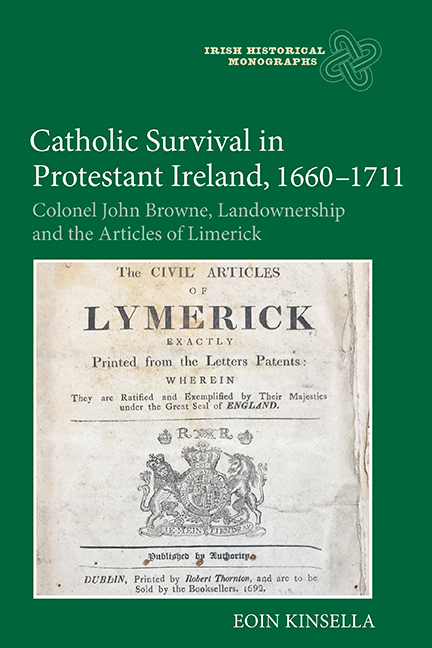 Catholic Survival in Protestant Ireland, 1660–1711
Catholic Survival in Protestant Ireland, 1660–1711 Book contents
- Frontmatter
- Dedication
- Contents
- List of Illustrations
- Acknowledgements
- List of Abbreviations
- Editorial Note
- Glossary
- Introduction
- Part I The Rise and Fall of the ‘New Interest’
- Part II The Articles of Surrender
- 3 ‘They were drawn by some furious lawyer’: Implementing the minor articles of surrender, 1691–1704
- 4 ‘With justice but not favour’: Implementing the articles of Limerick, 1691–1704
- 5 ‘The same was refused to the Galway men’: Implementing the articles of Galway, 1691–1704
- Part III Article 13 of Limerick
- Conclusion
- Appendix A Articles of Surrender, 1690–91
- Appendix B Hearings scheduled for adjudication under the articles of Limerick, 1694
- Appendix C Proclamations of 7 July & 1 August 1691; ‘A copy of and answers to several complaints made by the Irish by their agent Mr Cockly’
- Bibliography
- Index
5 - ‘The same was refused to the Galway men’: Implementing the articles of Galway, 1691–1704
from Part II - The Articles of Surrender
Published online by Cambridge University Press: 28 June 2018
- Frontmatter
- Dedication
- Contents
- List of Illustrations
- Acknowledgements
- List of Abbreviations
- Editorial Note
- Glossary
- Introduction
- Part I The Rise and Fall of the ‘New Interest’
- Part II The Articles of Surrender
- 3 ‘They were drawn by some furious lawyer’: Implementing the minor articles of surrender, 1691–1704
- 4 ‘With justice but not favour’: Implementing the articles of Limerick, 1691–1704
- 5 ‘The same was refused to the Galway men’: Implementing the articles of Galway, 1691–1704
- Part III Article 13 of Limerick
- Conclusion
- Appendix A Articles of Surrender, 1690–91
- Appendix B Hearings scheduled for adjudication under the articles of Limerick, 1694
- Appendix C Proclamations of 7 July & 1 August 1691; ‘A copy of and answers to several complaints made by the Irish by their agent Mr Cockly’
- Bibliography
- Index
Summary
Coming so soon after the defeat at Aughrim, the surrender of Galway in July 1691 was a crushing blow to the Jacobite army. Galway was long recognised as a weak point in Jacobite resistance and several of the town's inhabitants, including the Jacobite judge, Denis Daly, had maintained contact with the Williamite forces from late 1690. Others, such as Sir John Kirwan (a former mayor), Arthur French (mayor in 1691) and Oliver Martin were instrumental in convincing Ginkel to approach the town in July 1691 without waiting for his artillery. Their motivation was the retention of their estates in return for the surrender of the town without a siege. The articles of Galway were significantly more comprehensive than previous terms of surrender, indicating the importance of Galway to the Jacobite war effort, the pressure on Ginkel to conclude the war that year and the presence of skilled lawyers on the Irish side. The agreed terms related only to the residents and officials of Galway and the soldiers garrisoned there. Throughout the 1690s the Galway articlemen doggedly pursued the rights promised them by the articles. On several occasions their efforts led to the creation of an informal lobby group or committee, which met with qualified success. Concurrently, individual claimants petitioned for their rights under the articles. Their efforts were concentrated on the four principal articles: 8, 9, 12 and 13.
The articlemen of Galway, no less than those of Limerick, lobbied throughout the decade to ensure that the terms signed in July 1691 were honoured. Two separate bills were drafted by the Irish government in 1692 in an attempt to implement in part the articles of Galway. Of these, the indemnity bill has already been discussed in chapter 4. Section I of this chapter discusses the second bill, which related to the right of lawyers claiming the articles of Galway to continue practising after the war, alongside the reaction of the Galway articlemen to article 13 of Limerick. Several other issues arose in the 1690s that required the close attention of the Irish and English governments. Three men played prominent roles as lobbyists and advocates for the articles of Galway: Arthur French, Denis Daly and John Bourke, Baron Bophin and future earl of Clanricarde. French and Daly were instrumental in the negotiation of the articles, while article 13 of Galway was designed with Lord Bophin in mind.
- Type
- Chapter
- Information
- Catholic Survival in Protestant Ireland, 1660–1711Colonel John Browne, Landownership and the Articles of Limerick, pp. 123 - 144Publisher: Boydell & BrewerPrint publication year: 2018


